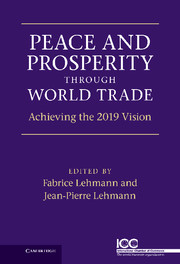Book contents
- Frontmatter
- Contents
- Notes on contributors
- Foreword
- Preface: the ICC vision
- Historical overview and dynamics
- Editorial note
- A Global systemic transformations
- B Governance of global trade
- C Poverty and global inequities
- D The long view on interlocking crises
- Editorial introduction
- D1 Trade and sustainable development: the ends must shape the means
- D2 Trade and climate change: the linkage
- D3 Destructive trade winds: trade, consumption and resource constraints
- D4 Trade and energy: a new clean energy deal
- D5 Agriculture and international trade
- D6 Water scarcity: how trade can make a difference
- D7 Water resources: a national security issue for the Middle East
- D8 Trade, technology transfer and institutional catch-up
- D9 A frail reed: the geopolitics of climate change
- E Global business responsibilities
- Conclusion: the imperative of inclusive global growth
- Index
Editorial introduction
Published online by Cambridge University Press: 05 July 2011
- Frontmatter
- Contents
- Notes on contributors
- Foreword
- Preface: the ICC vision
- Historical overview and dynamics
- Editorial note
- A Global systemic transformations
- B Governance of global trade
- C Poverty and global inequities
- D The long view on interlocking crises
- Editorial introduction
- D1 Trade and sustainable development: the ends must shape the means
- D2 Trade and climate change: the linkage
- D3 Destructive trade winds: trade, consumption and resource constraints
- D4 Trade and energy: a new clean energy deal
- D5 Agriculture and international trade
- D6 Water scarcity: how trade can make a difference
- D7 Water resources: a national security issue for the Middle East
- D8 Trade, technology transfer and institutional catch-up
- D9 A frail reed: the geopolitics of climate change
- E Global business responsibilities
- Conclusion: the imperative of inclusive global growth
- Index
Summary
The long view on interlocking crises
A theme running throughout the book is the need to restore balance between the benefits and risks of globalization. Many of the articles in the previous chapters make reference to the issues presented in this section, which aims to take the long view. Serious doubts exist about the environmental sustainability of our global growth models while many poor countries are hit by critical food security concerns. This chapter considers some of the contributions international trade can bring to tackling a set of intractable interlocking crises: climate, water, food and energy. All will have an incidence on welfare and future prospects for peace and prosperity.
The chapter opens with the observation that we have so far failed to establish international arrangements that ensure an enabling distribution of the benefits of global relations. The following two articles offer differing opinions on global trade rules and negotiations in the context of climate change and a planet constrained by resources. Four contributions on energy, agriculture and water then complement this debate. The first offers a scenario for a new clean energy deal in which trade and energy could be mutually reinforcing drivers of the global business environment, the second looks at the major distortions in the international trade of agricultural products, while the third and fourth concentrate their analyses on securing an efficient allocation of the water needed to grow food for an increasing world population.
- Type
- Chapter
- Information
- Peace and Prosperity through World TradeAchieving the 2019 Vision, pp. 183 - 184Publisher: Cambridge University PressPrint publication year: 2010
- 1
- Cited by

